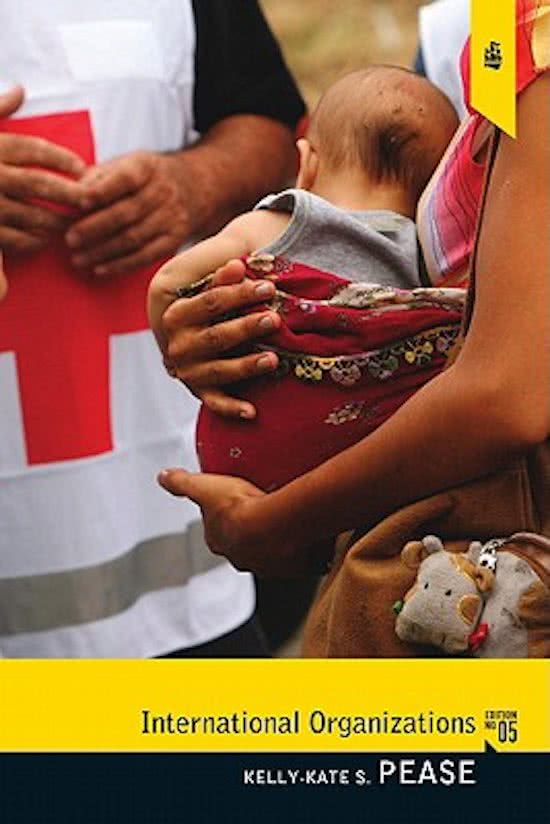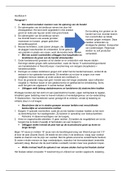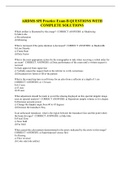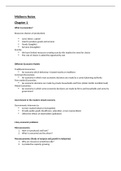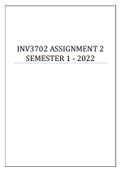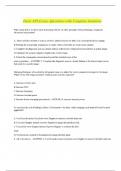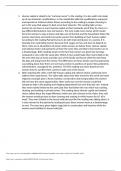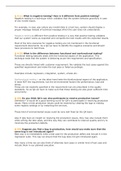CHAPTER 2:
Global IGOs:
Historical antecedents:
First international organisations since the time of Ancient Greece. But, according to a lot of
scholars the start of IGOs was the Congress of Vienna:
- Created by the European great powers to reestablish order and stability after the
Napoleonic Wars.
- Forum for international collaboration on European security and commerce.
- Rhine River Commission(1804).
League of nations:
- First global IGO with universal membership.
- 1919-1939, created after WWI
- Three bodies:
The Council The Assembly The Secretariat
Chief executive organ of the Functioned as a quasi- The League’s bureaucracy.
League. legislative body: it was
entitled(too) to address any
matter within the purview of
the League.
Victors of WWI and some Each LON-member belonged
small powers. to the assembly.
Mainly responsible for Each member had max. 3
addressing issues relating to representatives.
international war and threats
to international peace.
League’s charter: The Council
could deal at its meetings
with any matter within the
sphere of action within the
League.
League’s charter
Council, Assembly, Secretariat
(semi-)autonomous organizations established:
* Permanent Court of International Justice(PCIJ): Article 13: MS submit any matter unsolved by
diplomacy to international arbitration or judicial settlement.
,Summary NGO
* International Labor Organization (ILO): Social responsibility toward workers(article 23).
The PCIJ and the ILO were created to help member states meet their obligations under the
League’s Charter.
- ION based on three important principles:
Collective security
Peaceful settlement of disputes through such nonviolent measures such as mediation,
negiotation, arbitration, and adjudication.
Economic/social cooperation.
- Based on American values/Woodrow Wilson. But US did NOT join reason for failure.
United Nations
- Created in 1945.
- Was designed to be the center of multilateral diplomacy in postwar world politics.
- Central purposes:
Maintain international peace and security.
Develop friendly relations among nations.
Address economic, social, cultural, and humanitarian problems.
To promote respect for universal human rights.
- UN principle: the sovereign equality of all states. however, it also commits members to
the nonuse of force and the peaceful settlement of disputes.
- The UN is a comprehensive IGO to which, effectively, any state can belong.
- Structure:
6 principle organs:
1. General Assembly:
- Quasi-legislative, deliberative.
- Its principles are assigned by the UN Charter. The 5 principles are:
The General Assembly may deliberate and consider any issue or questions that may arise
under the charter.
It is responsible for initiating studies and making recommendations for promoting
political cooperation and the progressive development of international law.
It is responsible for promoting international cooperation in the economic, social, cultural,
educational, and health care fields.
It is charged to with drafting and approving the UN budget.
It oversees the UN bureaucracy.
,Summary NGO
- The General Assembly is based on the liberal democratic principles of political equality
and majority rule.
- Plenary body: All MS may attend and fully participate in General Assembly meetings.
- 192 state represented.
- Decision on one state/ one vote basis. Mostly a simple majority, by important issues is a
two-thirds majority required.
- It works like a parliament, but it does not produce binding law.
- The General Assembly , through its activities and its resolutions, best approximates the
priorities and sentiments of the ‘’international community’’.
2. The Security Council:
- Primary responsibility: Maintaining international peace and security. It is complicated
because it involves recognizing threats to international peace and security, crafting an
appropriate international response, building international consensus, and carrying out
collective security actions.
- MS are obligated to abide by and help to carry out the decisions.
- Only the resolutions in which a formal ‘’decision’’ under Chapter VII is issued.
Membership:
President
Members
Permanent Non-permanent
Five great-power victors of WWII
10 elected members selected from and
by the general assembly
veto
No veto: Decisions passed by an affirmative vote of nine members.
3. The International Court of Justice:
- World Court
- Created to be the principal judicial organ of the UN
- CHAPTER XIV of the UN Charter authorizes the ICJ to adjudicate disputes arising under
the charter and international law.
- 15 justices No more than 2 justices per member state.
- 9 years: selection process by General Assembly and Security Council.
, Summary NGO
- Majority vote
- Article 36 of the ICJ statute(optional clause): Allows parties to decide whether they want
to give the Court jurisdiction over their current and future international legal disputes.
- Very few states have given the Court this kind of jurisdiction; thus, states usually consent
to the court’s jurisdiction on a case-by-case basis.
- Access to the ICJ is also limited to states.
- All the states involved in a legal dispute must be willing to have the ICJ hear the case
before the Court will consider the merits(verdienste, waarde).
- The ICJ can, however, influence world politics as it is also responsible for providing
advisory opinions on legal questions for the Security Council or the General Assembly,
upon their request(aanvraag).
- Other agencies can also request advisory opinions of the court.
4. The Economic and Social Council:
The ECOSOC was established under the UN Charter(Chapter X) to promote economic and social
cooperation among member states.
- Actively involved in:
Economic development
Human rights
Social welfare
- Consists of 54 members elected by the General Assembly for three-year,
staggered(wankelende) terms.
- Each state 1 vote, majority vote.
- Several functions and powers:
May make or initiate studies/ reports about international economic, social, cultural,
educational, and health related matters and may make recommendations about matters
to the General Assembly, Members of the UN, and specialized agencies concerned.
Recommendations for promoting and protecting human rights.
May prepare draft conventions relating to economic and social issues.
May call international conferences on matters falling within its competence.
The ECOSOC is a collaborative body with authority to create commissions to promote human
rights and economic and social cooperation.
5. The Trustee Council:
- Created to oversee the transition of colonies into self-governing territories.


